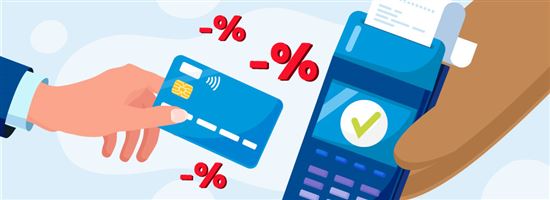Debit Card Processing Fees
Debit card processing fees are less expensive than credit card fees. But there's a lot more to learn about them than that. Read on.
 |
Debit card processing can be cheaper than credit card processing—as long as you consider the right factors.
The types of debit card transactions, caps from banks, and processor markups all play a role in its overall cost.
This article will serve as a guide to help you understand what to expect. You'll also learn about the best processors that won't break your bank. Read on.
Square Reader: Free Mobile Credit Card Reader
- Pay 2.6% + 15¢ Per Swipe for Visa, Mastercard, Discover, and American Express
- Accept Credit Cards Anywhere
- Fast Setup, No Commitments
What is Debit Card Processing?
Debit card processing enables you to accept debit card payments from your customers. Customers typically use checking or savings accounts connected to a debit card to make these payments.
It's less risky compared to processing credit cards. This is because you're taking money directly from customers' bank accounts—money that is their own, unlike with credit where customers borrow the money.
You'll need a debit card processing company to process these payments. They are merchant account providers or payment services providers that also process credit card payments.
Keep in mind that not all debit card transactions are the same. Keep scrolling for your options.
What are the Different Types of Debit Transactions?
When accepting debit card payments, you can process them as PIN debit or signature debit transactions.
PIN Debit Transactions
PIN (Personal Identification Number) debit is the most common type of debit card processing. It's also known as an online debit card transaction.
It needs to be authorized using the customer's PIN, so it's typically more secure than signature debit. Plus, because of real-time authorization, you'll know right away if the customer has sufficient funds in their account.
Payments are processed through debit card networks such as Accel, NYCE, and Star. This is unlike credit card processing which uses credit card networks such as Mastercard and Visa.
Signature Debit Transactions
As the name suggests, signature debit transactions require customers to sign receipts for their purchases. You can set thresholds (i.e., $25) for signatures. Customers won't be required to sign the receipts if they purchase less than this amount.
Signature debit is also called an offline debit card transaction. These transactions are "run as credit" since they're processed through credit card networks. They're simply marked as debit payments.
That said, be mindful of the "authorization hold."[1] Signature debit has no "real-time" authorization. This means you won't even know if the customer has enough money in their account.
It's not just the transactions that come in 2 types, however. There are also two types of banks affecting debit card fees. Read on.
Do Debit Cards Have Processing Fees?
Unfortunately, there are fees for processing debit card payments. Fees differ if a bank is a regulated bank or an unregulated bank.
Multiple services are involved every time you take debit card payments. The customer's bank (issuing bank), credit and debit card networks, and payment processors play a role. And they charge for their services through interchange, assessment, and markup fees.
Fees from Regulated Banks or Exempt Banks
The Durbin Amendment regulates banks with assets of $10 billion or more. For these banks, the debit card interchange fees are capped at $0.21 + 0.05% times the transaction value. There may also be an additional $0.01 for fraud protection.[2]
This cap applies to both PIN and signature debit transactions.
Fees from Unregulated or Non-exempt Banks
Unregulated banks, in turn, are those with less than $10 billion in assets. Although they're not regulated with said fees, some debit networks still cap the maximum fee.
Large interest groups or industries can negotiate with debit networks for caps on these fees. You can check if your industry belongs to such an agreement.
How much are debit card processing fees?
The average debit card processing fee per transaction is $0.38 for signature debit transactions and $0.25 for PIN debit transactions. The average for all networks is $0.34 per transaction.[3]
To help paint a better picture, here are some of the debit card interchange rates from VISA[4] and Mastercard:[5]
VISA Interchange Rates
| Card Present Transactions | Exempt Check Card Transactions | Regulated Check Card Transactions |
|---|---|---|
| Retail | 0.80% + $0.15 per transaction | 0.05% + $0.21 per transaction |
| Small ticket items | 1.55% + $0.04 per transaction | 0.05% + $0.2 per transaction |
| Restaurant | 1.19% + $0.10 per transaction | 0.05% + $0.21 per transaction |
| Retail Key Entry | 1.65% + $0.15 per transaction | 0.05% + $0.21 per transaction |
| Card Not Present Transactions | Exempt Check Card Transactions | Regulated Check Card Transactions |
| Electronic Interchange Reimbursement Fee (EIRF) | 1.75% + $0.20 per transaction | 0.05% + $0.21 per transaction |
| Standard Interchange Reimbursement Fee | 1.90% + $0.25 per transaction | 0.05% + $0.21 per transaction |
| Business Debit Fees | Exempt Business Debit | Regulated Business Debit |
| Business Debit, Card Present | 1.70% + $0.10 per transaction | 0.05% + $0.21 per transaction |
| Business Debit, Card Not Present | 2.45% + $0.10 per transaction | 0.05% + $0.21 per transaction |
| Business Utility Program, Recurring Bill Payment | $0.75 per transaction | 0.05% +$0.21 per transaction |
| Business Utility Program, Card Not Present Only | $1.50 per transaction | 0.05% + $0.21 per transaction |
Mastercard Interchange Rates
| Unregulated Consumer Debit Rates | Debit Rate |
|---|---|
| Restaurant | 1.19% + 0.10 per transaction |
| Service Industries | 1.15% + 0.05 per transaction |
| Payment Transactions | 0.19% + 0.53 per transaction |
| Regulated Commercial Debit Rates | Debit Rate |
| Regulated POS Debit | 0.05% + 0.21 per transaction |
| Regulated POS Debit with Fraud Adjustment | 0.05% + 0.22 per transaction |
| Payment Transaction | 0.19% + 0.53 per transaction |
| PIN Debit Rates | Debit Rate |
| PIN Debit Payment Transaction | 0.19% + 0.53 per transaction |
| PIN Regulated POS Debit | 0.05% + 0.21 per transaction |
| PIN Regulated POS Debit with Fraud Adjustment | 0.05% + 0.22 per transaction |
| PIN Debit All Other Base | 0.90% + 0.15 per transaction |
That said, interchange fees aren't the only fees to consider. Other fees depend on your payment processor or merchant account provider. You may be charged annual fees, monthly fees, PCI-compliance and non-compliance fees, etc.
Charging customers a fee or "surcharge" for using debit cards isn't allowed. The card networks, like Mastercard[6] and VISA[7], prohibit them. It's also against the law.[8] But because of the cap on interchange fees, accepting debit card payments can be lighter on the budget than credit cards.
Now that you know the fees, here's what really happens behind the scenes as you process these payments.
What is the Process of Payment with a Debit Card?
Whether you're accepting a signature or PIN debit, here's how the process works:
- The customer dips/swipes the debit card on your terminal.
- The payment processor sends the debit card information to the processing network. The network verifies the data and checks for fraud.
- The info is forwarded to the customer's bank (issuing bank). This issuing bank confirms if there are sufficient funds to make the payment.
- This info is relayed to the processor. If the payment is approved, payment will be withdrawn from the customer's bank account to your merchant account.
- After 1-2 days, your provider will transfer the funds to your business bank account (minus the fees).
You can use one processor for processing credit and debit card payments. So, what's the difference between the two?
What is the Difference Between Debit Card and Credit Card Processing?
While debit transactions can be processed through debit or credit card networks, credit card payments are processed through credit card networks alone.
Here's a side-by-side comparison of their differences:
| Credit Card Processing | Debit Card Processing |
|---|---|
| Riskier since customers are borrowing money | Less risky since customers use money that they already have |
| Customers can reap rewards depending on the type of their card | Customers receive limited rewards compared to credit cards |
| Higher cap on fees | Lower cap on fees |
| Can have surcharges | No surcharges allowed |
Debit Card vs. Credit Card Fees
| Debit Cards | Credit Cards | |
|---|---|---|
| Maximum cap on fees | $0.21 + 0.05%[9] | 3% Visa;[10] 4% Mastercard[11] |
| Average processing fees | $0.34 or 0.73% of the average transaction value[9] | 1.5% - 3.5%[12] |
| Pricing model | Depends on your payment processor | Depends on your payment processor |
Credit card processing fees tend to be costlier than debit card fees. You should consult with payment processors to find out exactly how much you're expected to pay.
Interchange-plus pricing is the most transparent pricing model. You'll see exactly how much the interchange rate, card brand, and processor markup fees are.
But you may be offered other pricing models, including subscription, flat rate, and tiered pricing.
Start Accepting Payments Fast
- Interchange Plus Pricing
- No Monthly Fees
- No Contracts
If the fees are too expensive, keep reading for ways to lower them.
How to Lower Debit Card Processing Fees
Debit card fees can still pile up. This is especially true if most of your customers use debit cards for payments.
Here's what you can do about it:
- Use PIN debit if you sell pricier products.
PIN debit transactions typically have higher per-transaction fees and lower percentage fees. This makes them more suitable for large-ticket items. If you're selling cheaper products, it'll be more expensive for you as a merchant. - Use signature debit if you sell affordable products.
On the other hand, signature debit transactions often have lower per-transaction fees with higher percentage fees. It's doable if you sell small-ticket items. - Consult with your processor about debit routing.
A customer's debit card can be processed in various debit networks. Consult your payment processor about how many debit networks they work with. Then ask about how their dynamic routing works.Ideally, each debit card payment will be processed with the least expensive debit network (in terms of interchange fees).
- Negotiate other fees set by your processor.
Interchange fees set by card networks are typically non-negotiable. But fees set by your debit card processor aren't. You may be able to negotiate monthly fees, minimum volume fees, compliance fees, etc. - Ask your processor for interchange-plus pricing.
Interchange-plus pricing is the most transparent and can be the most affordable pricing model.Some interchange-plus processors don't even charge monthly fees, so your account is free. It can be the ideal pricing model, especially if you're a quickly growing business.
After learning all about debit card processing, you can get started on searching for the right processor below.
Best Debit Card Processing Companies
The best debit card processors are also the top credit card processing companies. This list highlights those that can offer you interchange-plus pricing.
Helcim: For Quickly Growing Businesses
Helcim is one of the best merchant account providers offering debit card processing. You'll be offered interchange-plus pricing, so you'll know exactly how much you're paying for interchange rates, card brand fees, and processor markup.
Your account is also free, so you won't need to worry about monthly fees. The best part, however? The higher your sales volume, the lower the rates. So it's most suitable for growing businesses.
Helcim also offers a smart terminal and a card reader so you can take payments in person. This makes it convenient for brick-and-mortar stores that don't have their own processing equipment yet.
Start Accepting Payments Fast
- Interchange Plus Pricing
- No Monthly Fees
- No Contracts
Dharma Merchant Services: For B2B Businesses
Dharma Merchant Services is another merchant account provider that offers interchange-plus pricing. Your rates will vary depending on your industry. Some supported industries include retail, restaurants, and B2B businesses.
Unlike Helcim, however, Dharma charges monthly fees. If you're a B2B business, your merchant account will cost $15/mo. But what makes Dharma suitable for your industry is its expertise and the tools it offers.
Dharma is also very transparent with their fees. You can even get reduced rates if you process $100,000/mo.
PaymentCloud: For High-Risk Businesses
PaymentCloud is one of the best high-risk merchant account providers. You get customized payment solutions depending on what your business needs. Plus, a dedicated account manager will be there in case you have concerns.
PaymentCloud offers customized pricing, so you won't know your rates until you reach out to them. On the plus side, this can provide more room to negotiate your fees.
As a high-risk business, you may want to expect higher rates than usual. But PaymentCloud can be a good choice since it supports chargebacks of up to less than 3%. Traditional merchant accounts can flag your business if you reach just 1%.
High Risk? No Problem
- Competitive Options for Payment Processing at All Risk Levels
- Fast Funding
- No Setup/Hidden Fees
- No Minimum Credit Score
- All Industries Accepted
Stax: For Large Enterprises
Stax is a merchant account provider that offers membership pricing, hence it's best for larger businesses. Monthly fees cost $99 to $199/mo, which can be expensive for small or new businesses.
That said, you'll only be paying the direct cost of interchange rates per transaction. This means you can say goodbye to processor markups that can make processing fees pricier.
Similar to other processors on this list, you can accept payments in person, online, and manually with Stax. Apart from debit cards, you can also accept other payment methods such as credit cards, ACH, and contactless payments.
Save Up to 40%
- Flat Monthly Subscription Price, Starting at $99
- 0% Markup on Direct-Cost Interchange
- 24/7 Support
What the Experts Say
CreditDonkey asked a panel of industry experts to answer readers' most pressing questions. Here's what they said:
The Bottom Line
Debit card processing lets you accept debit card payments from your customers—which can be significantly cheaper than processing credit card payments.
That said, there are many factors that affect the debit card fees. How much you end up paying will depend on the type of debit card transaction, interchange fees, and processor markup.
Also, the process of accepting debit card payments works similarly to accepting credit card payments. It boils down to choosing the right processor to make the work easier for you.
References
- ^ Direct Financial. Debit Card Holds, Retrieved 02/21/2024
- ^ Federal Trade Commission. New Rules on Electronic Payments Lower Costs for Retailers, Retrieved 02/21/2024
- ^ Federal Reserve System. Debit Card Interchange Fees and Routing, Retrieved 02/22/2024
- ^ VISA. Interchange Reimbursement Fees, Retrieved 02/15/24
- ^ Mastercard. Merchant Rates, Retrieved 02/15/24
- ^ Mastercard. Merchant Surcharge FAQ, Retrieved 02/21/2024
- ^ Visa. Surcharging Credit Cards–Q&A for Merchants, Retrieved 02/21/2024
- ^ GSA SmartPay. Smart Bulletin, Retrieved 02/21/2024
- ^ Federal Reserve System. Debit Card Interchange Fees and Routing, Retrieved 02/21/2024
- ^ Visa. Merchant Surcharge Q and A, Retrieved 02/21/2024
- ^ Mastercard. Merchant Surcharge FAQ, Retrieved 02/21/2024
- ^ CreditDonkey. Credit Card Processing Fees, Retrieved 02/21/2024
Write to Karen Eloriaga at feedback@creditdonkey.com. Follow us on Twitter and Facebook for our latest posts.
Note: This website is made possible through financial relationships with some of the products and services mentioned on this site. We may receive compensation if you shop through links in our content. You do not have to use our links, but you help support CreditDonkey if you do.
Not sure what is right for your business?
|
|
|
|
|
|














